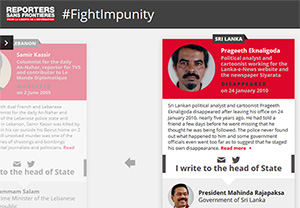
PARIS (Reporters Without Borders / Pacific Media Watch): Reporters Without Borders (RSF) is calling for the creation of the position of special adviser to the UN secretary-general on the safety of journalists.
The Paris-based media freedom organisation announced this yesterday when launching its #Fightimpunity campaign with a new website highlighting 10 "emblematic" cases marking the first International Day to End Impunity for Crimes against Journalists on Sunday.
The aim is to involve the general public and step up pressure on governments to bring those responsible for these crimes to justice.
Creating such a post at the heart of the UN system would enable monitoring and verification of states’ compliance with their obligations under UN Security Council Resolution 1738 and the General Assembly resolution of 18 December 2013.
When the UN General Assembly created the international day on 13 December 2013, it designated 2 November, the anniversary of the murder of the two Radio France Internationale journalists, Ghislaine Dupont and Claude Verlon in Kidal, Mali, in 2013.
Reporters Without Borders has chosen these 10 cases to put names and faces to the tragic statistics and to show the scale and different forms that impunity can take. The resources deployed by authorities to solve these and many other cases have been either non-existent or hopelessly inadequate. More than 90 percent of crimes against journalists are never solved and therefore never punished.
These ten impunity cases are presented on a specially created website, http://fightimpunity.org/en. Some of the victims disappeared, such Mexican crime reporter María Esther Aguilar Casimbe, Abidjan-based French journalist Guy-André Kieffer, Iranian newspaper editor Pirouz Davani and Sri Lankan political analyst and cartoonist Prageeth Eknaligoda.
Some were murdered such as Pakistani reporter Syed Saleem Shahzad, the young Serbian journalist Dada Vujasinovic, the Beirut-based columnist Samir Kassir and the Dagestani journalist Akhmednabi Akhmednabiyev, who was gunned down in 2013.
Dawit Isaak, a journalist with Swedish and Eritrean dual nationality, has been held incommunicado in Eritrean President Issayas Aferworki’s hellish prison camps for the past 13 years, while police officers tortured Bahraini reporter Nazeeha Saeed for covering pro-democracy demonstrations. RSF secretary-general Christophe Deloire said:
“We must never abandon journalists who are the victims of crimes, not even posthumously. The ten impunity cases we are presenting are shocking examples of incompetence or wilful inaction by officials who should be punishing despicable crimes against those who have tried to describe reality as it is.
“Such a level of impunity just encourages those who commit these abuses. International Day to End Impunity for Crimes against Journalists is an occasion for paying tribute to the victims, reminding governments of their obligation to protect journalists and combat impunity, and reminding those who target journalists that one day they will be held to account for their actions.”
Whether killed execution-style, blown-up by a bomb, tortured to death or disappeared, these journalists paid the price for their commitment to freedom of information. They were targeted for investigating corruption or drug trafficking, for criticising the government or intelligence agencies or for drawing attention to human rights violations. Some of the cases have become emblematic, others are less well known.
Those responsible were many and varied, and include governments, armed groups and hit-men. RSF blames the shortcomings of police and justice systems for the failures to solve these cases or to convict the perpetrators and instigators.
Around 800 journalists have been killed in connection with their work in the past decade. The deadliest year was 2012, with 88 journalists killed. The number of killed fell slightly in 2013 but the figures for physical attacks and threats against journalists continued to rise. At total of 56 journalists have been killed since the start of 2014.
Read the full RSF report and recommendations
This work is licensed under a Creative Commons Attribution-NonCommercial 3.0 New Zealand Licence.




